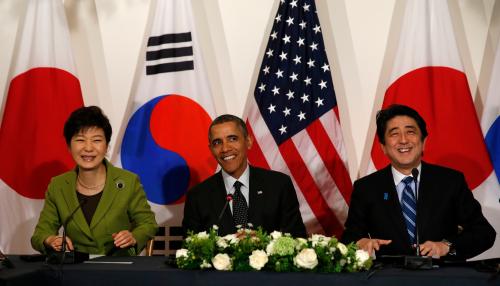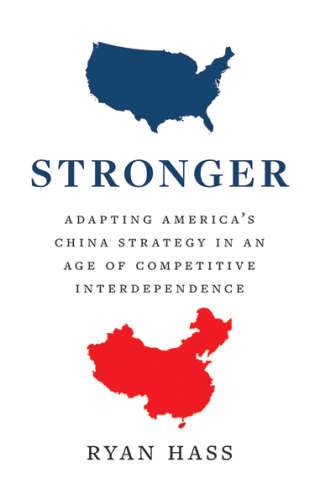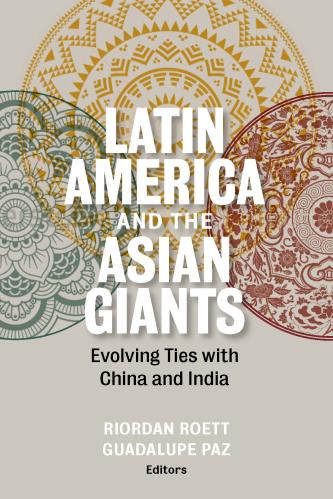Content from the Brookings-Tsinghua Public Policy Center is now archived. Since October 1, 2020, Brookings has maintained a limited partnership with Tsinghua University School of Public Policy and Management that is intended to facilitate jointly organized dialogues, meetings, and/or events.
American leadership in Asia holds the most promise of protecting the peace, preserving respect for rule of law and human rights, unlocking opportunities for U.S. businesses, and increasing burden-sharing for dealing with transnational challenges, writes Ryan Hass. This piece originally appeared in The Seattle Times.
In recent weeks, and particularly following President Donald Trump’s November trip to East Asia, I have heard one recurring question in my travels around the United States: Why is it that big a deal if the United States cedes leadership in Asia to China?
There is a sense that the U.S. has pressing needs at home, that the North Korea challenge feels dangerous and intractable, and that China’s national power is on the rise — so China or others should do more to manage problems in their own backyard.
While I support focusing on getting our house in order at home, I fear that it would be dangerously shortsighted for the U.S. to retreat from its 70-plus-year status as the leading power and agenda-setter in the Asia-Pacific region.
We have to be able to walk and chew gum at the same time. Here’s why:
First, the Asia-Pacific region is rapidly becoming the most important area in the world for the U.S. It accounts for nearly 60 percent of global economic growth, and U.S. exports to the region create more jobs (3.4 million) than any other part of the world. It is home to five U.S. treaty allies, many of the world’s most capable militaries and the most proximate threat to America’s national security: North Korea’s nuclear and missile programs.
When America has been active in the region, it has spurred Asian countries to share the burden in responding to humanitarian disasters, dealing with climate change, increasing pressure on North Korea and agreeing on trade rules for nearly 40 percent of the global economy. At the same time, the U.S. has led efforts to push China to emerge as a constructive — and not a coercive — actor. If the U.S. withdraws from these roles, there is no other country capable of pulling the region together in common purpose to address shared challenges.
Second, America’s long and steady presence in the region has helped deter aggression, cool historical rivalries, and support the spread of market-based democracies. While the people of the region deserve credit, the U.S.-provided security umbrella also enabled progress.
Up to now, the U.S. has served as a buffer in regional disputes, and a check against China or others seeking to use their military to move borders or seize resources. If confidence in U.S. resolve to protect the peace recedes, the risk of interstate conflict will rise. Countries will confront a choice between becoming more deferential to Beijing’s interests in exchange for hoped-for security and economic benefits, or developing military capabilities — including nuclear weapons — to guard against coercion by China or North Korea. If Japan goes nuclear, for example, South Korea and Taiwan could follow. A pattern of nuclear dominoes would elevate risk of a catastrophic conflict that could crater the global economy and create unimaginable destruction.
Third, sustained U.S. support for rule of law and human rights has helped generate a more just and predictable environment for American businesses and travelers. For decades, the U.S. has promoted freedoms of speech, worship and peaceful assembly; the ability to choose leaders democratically; and the right to due process and equal administration of justice. These efforts have garnered goodwill for the U.S. by aligning U.S. power with aspirations of ordinary people.
If the U.S. pulls back from promoting human rights, China will step up its efforts to influence domestic politics throughout the region — pressuring politicians, entrapping special interests, and filtering what information reaches the public. Beijing would like to normalize its model of privileging internal security over individual liberties. There also could be heightened risk of democratic backsliding, as leaders feel less inhibited from resorting to strongman governance.
Fourth, a diminished U.S. role would embolden China to seek to hasten the return of a Sino-centric regional order. Broadly speaking, Beijing would like to maximize its influence and minimize Washington’s throughout the region. In instances where interests clash, such as over trade and maritime disputes and America’s alliance relationships, Beijing would like regional governments to side with it. Beijing also would like to lock in trade agreements and investment patterns that place China at the center and the U.S. on the outside. This would put U.S. firms at a disadvantage. Beijing does not seek to conquer new territories, but rather hopes to gain regional acceptance of the notion that China sits atop a hierarchical regional structure. Beijing views such a distribution of power as a restoration of a natural order.
So, why does it matter if the U.S. remains the agenda-setter in the Asia-Pacific? Because American leadership still holds the most promise of protecting the peace, preserving respect for rule of law and human rights, unlocking opportunities for American businesses, and increasing burden-sharing for dealing with transnational challenges. And if the U.S. withdraws, Beijing will seek to fill the vacuum. That outcome would raise the risk of democratic backsliding, nuclear proliferation, disadvantaging U.S. companies and intensifying great power competition. Given the growing importance of Asia to America’s national security and economic well-being, this is an outcome the U.S. can ill-afford.










Commentary
Op-edThe case for continued American leadership in Asia
December 29, 2017